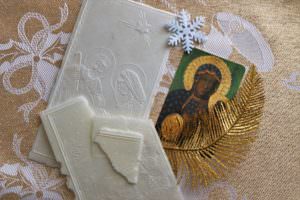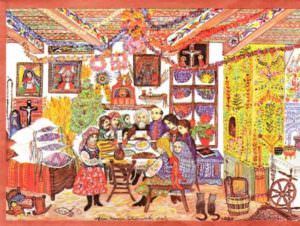Day 10: Tradition

Editor’s note: Teresa Redder is a Secular Franciscan and a member of the FMS Board of Directors. She also serves as the secretary for St. Katharine Drexel Region (OFS) and her local fraternity’s formation director. She is married and has four children and six grandchildren. In this blog, Teresa reflects on the richness of Polish Christmas traditions celebrated in her family while inviting readers to reflect on why traditions–from any culture–are so special.
Admittedly, I am a PBS and NPR aficionado. There is rarely disappointment in watching programs such as Masterpiece, Masterpiece Mystery, Nova, American Experience, POV, and so many others. Recently, I was delighted to see a PBS announcement for a special program on Great Performances called Fiddler on the Roof: A Miracle of Miracles. Not only did this show bring back good memories, but it also reminded me of the richness of tradition for generations and cultures.
When our two daughters were active in Girl Scouts, we worked on the “I Live My Faith” award as juniors (5th/6th grade). As our group of scouts worked together, they learned about the significance of tradition in the Church. The program booklet required us to watch the video of Fiddler on the Roof, with its rich presentation of tradition in Jewish communities. The movie began with the delightful song “Tradition.” It was such a powerful way of sharing how people hand down their traditions to one another!
When I grew up in Camden, NJ, I lived in a very close-knit Polish-American community. My grandparents emigrated from Poland to the US in 1910. Our parish and homes were bi-lingual. Every year, my brothers and I looked forward to Advent and the Christmas season, when some of the finest Polish traditions would be celebrated in our homes and the faith community.
On Christmas Eve, our family gathered at my grandparents’ home for the traditional Wigilia (Vigil) supper, where we gathered to anticipate the coming of Christ. As we walked to my grandparents’ house in the early evening darkness, my Dad had us search the sky for that first star that marked the beginning of this celebration. As members of our large family (Dad was one of seven) gathered at the table, our Dziadzia (grandfather) would offer a blessing before our meatless meal of odd-numbered courses and then offer the opłatek (wafer bread) to each of us to break with one another. It was a special time of wishing joy, peace, and blessings to one another in the love of Christ. Now, I am the Babci who hosts our family’s Wigilia suppers, gathering with our four children, in-laws, and six grandchildren with the hope that they will pass on this tradition with the same timelessness and awe that I learned.
As part of the Wigilia tradition, my Babci (grandmother) set an extra place at the table for the stranger who might visit our home that night, being welcomed with the same joy as Jesus. During a Christmas Eve blizzard one year, I stood at the front door before supper, watching earnestly for that stranger to find his/her way safely to us. Babci even stood with me for a while as we waited. The place setting was there throughout our entire meal, including a piece of opłatek to share together. It assured me greatly to know that every Polish home had a place set for the stranger.
There is comfort and joy that come from sharing traditions. In our lifetime, we welcome friends, new family members, and co-workers who expose us to their delightful traditions. Rich in symbols and simple moments of wonder, they illuminate the many ways that people can be present to one another, leaving us so satisfied with what we have shared and anticipating when we will do it again. Traditions—so worth handing down!

